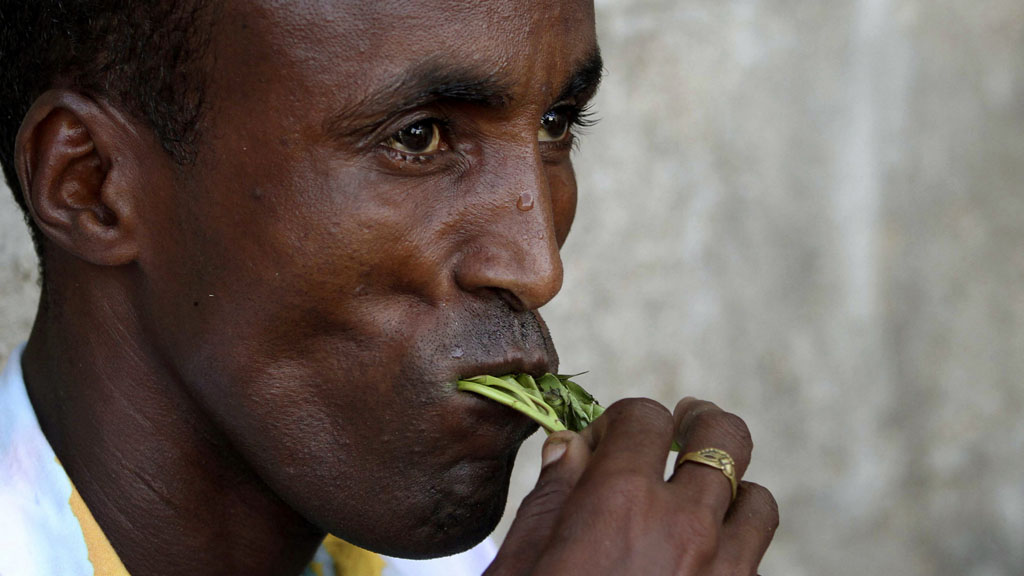Khat to be banned in UK – against drugs body’s advice
 Jamal Osman
Africa Correspondent
Jamal Osman
Africa Correspondent
Following a well-targeted campaign, the UK government has banned khat, a stimulant drug widely used by members of east African communities in the UK.

Khat, a stimulant drug will be banned within weeks, Home Secretary Theresa May announced today, writes Jamal Osman.
The fresh leaves are chewed to achieve a state of mild euphoria. Its stimulant effect is similar to that of amphetamines.
The drug is to be criminalised as a class C drug amid concerns that the government risks underestimating its health and social harms, Ms May said.
In a written statement, she noted that the body had acknowledged there was an absence of robust evidence in a number of areas. The ACMD, the government’s adviser on dangerous drugs, has previously concluded khat should not be banned.
The home secretary said: “The decision to bring khat under control is finely balanced and takes into account the expert scientific advice and these broader concerns.”
Khat is used by 90,000 members of east African and Yemeni communities in the UK, mainly Somalis.
‘Contempt for reason’
Last week, Professor David Nutt, chair of the Independent Scientific Committee on Drugs, said: “Banning khat shows contempt for reason and evidence, disregard for the sincere efforts of the Advisory Council on the Misuse of Drugs.”
And he urged the government “to abandon plans to ban khat and to accept in full the ACMD’s evidence-led recommendations of how the relatively low harms associated with this drug could be minimised.”
David Nutt is a former chief drug adviser who was sacked in 2009 by the then home secretary, Alan Johnson, after criticising the government’s decision to toughen the law on cannabis. He seems to be speaking on behalf of some members of the ACMD.
The group released a report in January this year. It stated: “Without the necessary data and robust evidence to support proportionate intervention, the ACMD does not recommend that khat be controlled under the Misuse of Drugs Act 1971.”
However, there is a huge pressure on the home secretary from three main groups. The product is banned in most of Europe, the US, Canada and Australia, and therefore Britain has become a hub for khat smuggling. So these nations would want to see UK authorities come into line.
Khat is believed to cause social problems such as unemployment, family breakdown and mental health issues. Health workers who deal with those affected by the use of khat have been demanding robust action.
Gender divide
More importantly, though, the khat-using communities are divided. As our story early this year showed, the majority of them will be happy to see it outlawed.
Often, women have to look after the children while their husbands spend hours chewing khat. Many of the khat consumers are unemployed and must use the little income the family receives to buy khat. That causes families to separate.
Anti-khat campaigners have been pushing hard for a complete ban. They have learned how to influence British politics: they regularly hold demonstrations, attend meetings at local authorities, and offer votes to local politicians who support their cause (the Conservatives would probably get thousands of votes as a result of banning khat).
The activists never miss the opportunity to link khat to crime, headlines like these help their cause: “Police take war on extremists to ‘khat’ houses amid fears they are recruiting grounds for Islamic extremists”.
On the opposing side, the Kenyan government, which makes a huge income from this trade, will try to persuade the British government not to ban it. Over 80 tonnes of khat is exported from Kenya into the UK every week. Thousands of Kenyan khat farmers will lose their income.
Khat-chewers and the businessman who import into the UK do not want to be criminalised, but they do not have representatives either. In fact, due to the stigma attached to the use of khat, most of them tend to avoid publicly advocating their cause.
Divided scientists
As for the scientists, they are not united on the issue. Since the ACMD report in January, Theresa May has been working very hard to divide them, and has probably managed to convince more of them to support the ban on khat.
This, however, does not mean scientists will give up easily. They may seek support from other advisory groups and eventually threaten to resign.
However, it is unlikely Theresa May will bow to the pressure. She can find other scientists willing to replace those who may resign. She will become a hero to an unlikely group of people: thousands of Somali mothers who suffer as a result of khat use.
We may see Somali women outside the Home Office, bearing photos of Theresa May inscribed with the words “Thank you”.
-
Latest news
-
Ex-Trump lawyer Michael Cohen testifies at hush money trial3m

-
Racial hate speech laws being ‘weaponised’ warns National Black Police Association7m

-
‘Hard to believe so many women going through such horrors’, says woman whose baby daughter was stillborn8m

-
Damning report condemns ‘shockingly poor’ UK maternity services12m

-
People ‘expecting the West to stand by Georgia’, says opposition party leader5m

-




